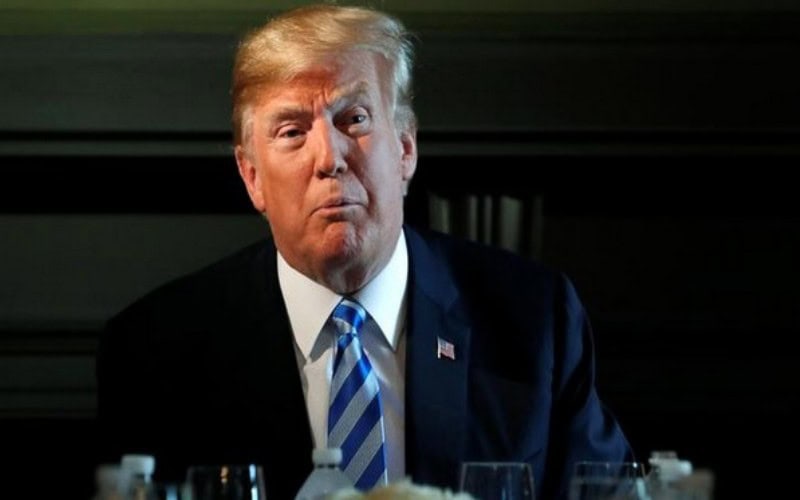New York: A politically enfeebled President Donald Trump will face the nation on Tuesday night with his State of the Union Address to a joint session of Congress that was put on hold by his Democratic Party adversaries in a budget war where he lost the first round.
His nationally-televised speech (at 7.30 a.m. on Wednesday in India) in the House of Representatives’ chamber that a sixth of the US population is expected to watch will be his attempt at clawing his way back to relevance.
It was in the House that his party lost the majority last November and he suffered a personal defeat last month when he could not get it to agree to allocate $5.7 billion in the budget for his signature campaign promise of a wall along the Mexican border to deter smuggling and illegal immigration.
“This is the defining moment of his presidency,” said Republican Senator Lindsey Graham.
The government’s agenda for next year that he will be laying out in his speech will be the first salvo in the campaign for the presidential elections due next year with the prospective candidates already lining up on the Democratic side.
When he takes the podium at the half-way mark of his presidency, there will be signs of disarray all around his administration in personnel and policy. There are five Cabinet vacancies, including the portfolios of Defence, Interior and Attorney-General, and he doesn’t have a Chief of Staff.
And the foreign policy is incoherent.
But his is obsession with a border wall overrides all else for him.
The funding war for the wall was a gamble that backfired. Trump refused to allow a budget without the money for a border wall and forced a government shutdown betting that it would make the Democrats back down.
But Speaker Nancy Pelosi outsmarted him by taking his challenge and waiting for the tide to turn against him, which it did a month into the shutdown as his public opinion ratings fell and rumblings of rebellion in his party emerged.
It was also a blow to his personal machismo, being humbled by Pelosi, a 78-year-old woman whom he underestimated, and to the negotiating skills he boasted about.
Now another shutdown looms if their temporary truce to reopen the government does not yield a compromise within the 10-day deadline he has set.
Trump has changed the campaign script about the wall, making it into a combination of tall see-through slats that don’t cover the entire border and some hi-tech deterrents, which could be the most he could wrangle out of the Democrats in the negotiations between Congressional leaders of both parties to meet the February 15 deadline.
He could then make it sound like getting what he wanted.
On the other hand in an interview last week with The New York Times, Trump dismissed the negotiations on border security funding a “waste of time”. He dangled the threat of doing it his way by declaring a state of Emergency citing the crisis at the border where thousands of Central Americans have converged in caravans and using the military to build the wall with defence funds and bypass Congress.
But his own party opposes such an extreme move.
His speech may give a clue to how he plans to deal with the dilemma.
The Democrats have picked Stacy Abrams, an African-American woman who narrowly lost the race for Governor in Alabama to give the party’s response to the President — an unusual choice meant to highlight the contrast between the two parties.
Taking stock at the midway point of his four-year term, in the foreign policy domain, he is at odds with his party and officials.
Trump’s announcement of troop pullouts from Afghanistan and Syria drew sharp criticism from his own party leaders with Republican Senate leader Mitch McConnell pushing through a Senate measure opposing them and stressing that the fight against the Islamic State was not over.
His intelligence chiefs contradicted him before Congress on Syria (IS was still a danger), Iran (it was observing to the denuclearization agreement) and North Korea (it wasn’t going to completely denuclearize).
In the middle of the muddle, he announced that the US would pull out of the Intermediate Nuclear Forces (INF) Treaty with Russia banning short and intermediate range missiles, set up a meeting with North Korean dictator Kim Jong-un later this month and delved into Venezuelan internal politics by recognising opposition leader Juan Guaido as President.
Iran remains the focus of his Mideast policy, even though the tide of opinion is rising in the US against Saudi Arabia after the killing of Washington Post columnist Jamal Khashoggi.
On the trade front, though, he may have one singular success in the works if China agrees to a trade deal that would help reverse the US adverse balance of payments if the current trend of negotiations persists.
And internally he scored an under-appreciated achievement belying his tough right-wing image: He managed to get a bipartisan criminal justice reform passed with the support of both parties. It will roll back tough punishments for a variety of federal crimes and give judges more leeway in imposing sentences and assuage complaints that minorities are unfairly given stiff punishments.
The economy is chugging along steadily as if on auto-pilot, with the stock markets recovering from the last year-end selloff and unemployment at historic lows.
[source_without_link]IANS[/source_without_link]

